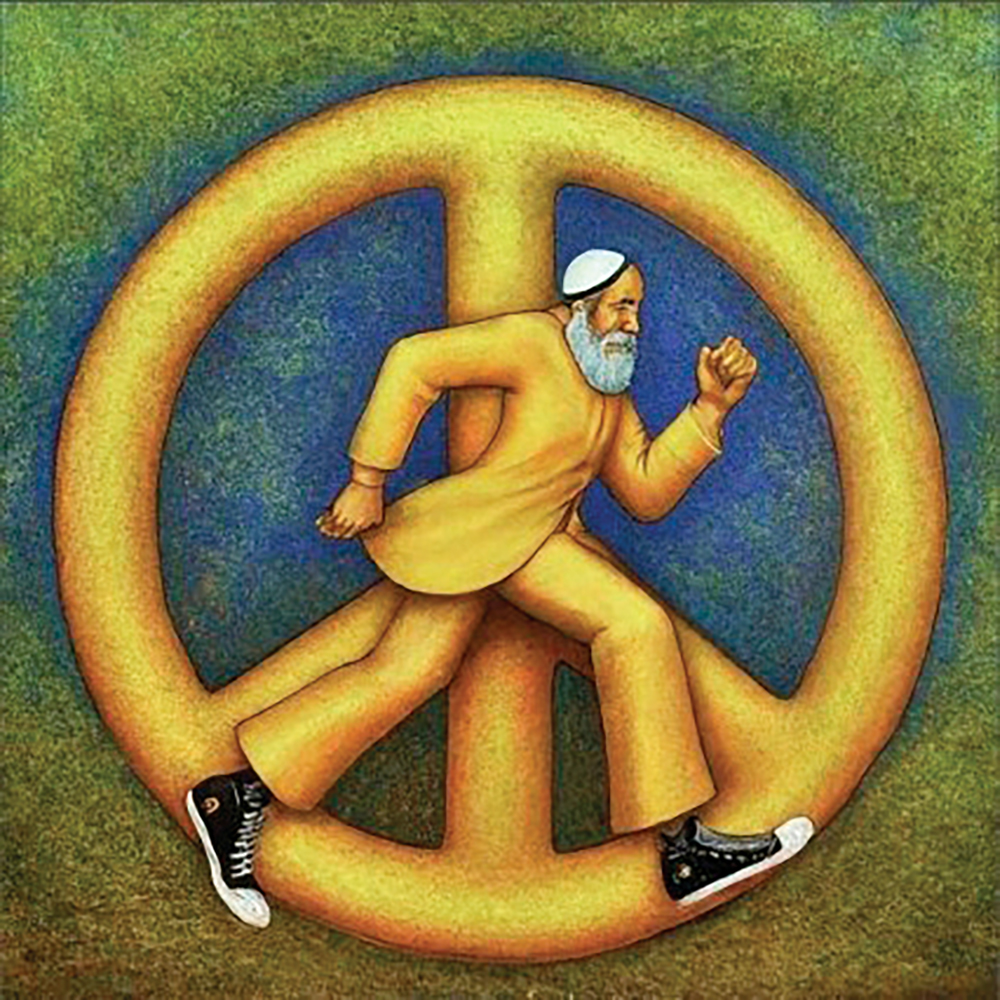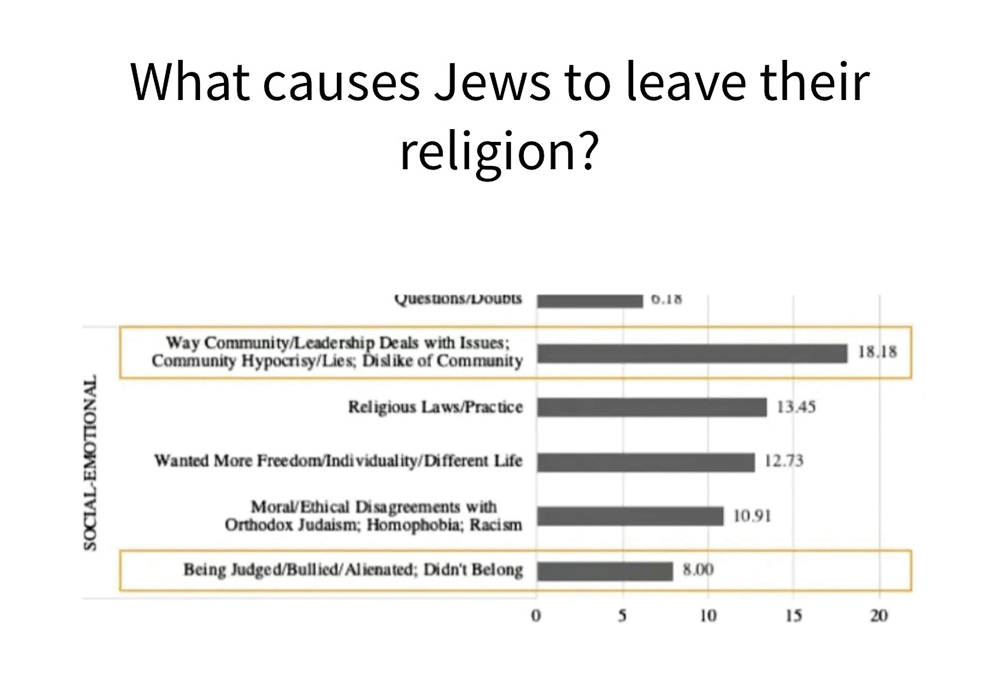
A significant, yet often unspoken, issue within many Jewish communities is the way in which interpersonal conflicts can escalate without proper resolution frameworks. Whether they are disputes over religious practices, family matters or social dynamics, these conflicts often intensify unnecessarily due to a lack of communal resources designed to address and resolve them. As tensions rise, individuals can feel alienated, misunderstood or hurt. Without effective intervention, this can result in people feeling compelled to distance themselves or even leave their communities entirely.
“We moved to [our community] and didn’t get invited out,” said a former member of a local Jewish community. “We felt alone and not part of the community. We then felt a distinct lack of empathy and collaboration from a local institution when a conflict came up.”
A member of another community explained why her family is not involved in the shul anymore. “Life as an outsider is hard. I don’t know where I went wrong: COVID? My kids? Me? What happened to people not just posting flyers but also asking if others wanted to go to things together? Maybe I am just too old. I don’t know how to help. I am resigning myself to be in an exile of sorts, and I hope it’s better for my kids.”
A member of a third community talked about his family’s uncomfortable situation: “Our primary reason for moving to [a particular community] was to raise our children. But we have found instead a fertile ground for bullying, lying and abuse amongst the youth. We ignored warnings from a minority of parents detailing this problem when we first arrived. The vast majority ignore or downplay the issues. Many have left the shul. We simply don’t see them anymore. They are out of sight, hence out of mind. Dissenting voices, no matter how kindly they are delivered, are flatly unwelcome. At times, we too feel unwelcome. We fear being completely outcast from the community if we publicly express our experience.”
Omer Neumeier, a resident of Stamford, Connecticut, has created an organization called Project Aharon to help in situations such as these. Project Aharon’s mission statement is “chasing peace by advocating conflict management in our communities.”
“Unfortunately, the culture for many Jews is: My way or the highway,” said Neumeier. “So people get upset and leave their shuls to join other shuls. It breaks my heart. There are people who switch shuls, people who uproot their families to move to other communities, and people who simply pull back. They wanted to be part of the shul—it was a major part of their life. But they just felt so hurt that they decided not to be active anymore.”
Neumeier reflected that politics and money are often factors. “I don’t blame congregational leaders for needing to survive and therefore acting the way they do. I think it’s often the community’s fault for not stepping up and saying, ‘Someone has been hurt. What can we do to help the leaders fix this? Do we need mediators? Training? A consultant? Alternative ways of fundraising so people don’t have too much power?’ Project Aharon is designed to get people to talk.”
Neumeier has seen that people tend to underplay problems or shrug them off. “There’s a ubiquitous mental block that if you try to talk about how conflict drives people away, community members will often be reticent and defensive. Unless they have been victims themselves, in which case they will say, ‘This makes sense and it’s very painful.’ ”

Project Aharon is composed of a group of people who acknowledge these problems and understand that there are solutions available. They are dedicated to raising awareness and saying with one voice that improving conflict management can help avoid these situations in the future.
“We should talk about it formally, and explore our solutions. Every community might have their own different solutions and customs,” said Neumeier. “Some may have excellent rabbis who are empathetic and caring. They may not need to partner with a conflict resolution agency, and instead focus on raising awareness. Project Aharon is trying to get people coordinated—like a union. A recent study has shown that many people leave Orthodox Judaism because of how communities deal with issues. Project Aharon’s goal is to bring that number down and stop people from leaving.”
Neumeier hopes that Project Aharon will form branches to put positive, constructive pressure on community leaders. “We aren’t trying to change leaders. But they need help. As a management consultant, my job is to analyze systems and help leaders get to their goals. It’ll never be perfect. But it’s about continuously improving. In my mind, that’s the most spiritual thing in Elul. It’s about identifying where you want to be better. Even if the problem isn’t completely fixed, it’s often enough for the people involved to feel heard and validated, and to see that there are people who care about them.”
Once a chapter of the project is established, there are many different options to pursue. Project Aharon will help chapters connect with partners who can help them: Keilim is an organization of professional consultants that work with Jewish organizations and leaders to develop policies and procedures that create safer, more respectful, and more equitable environments for those who work at or access Jewish organizations. Jewish Family Services (JFS) is another organization that specializes in helping communities deal with interfamilial conflicts. Ultimately, a more unified effort across multiple chapters spreads the word, grows the number of chapters, and truly effects change in the communities.
A representative from the Schoke Jewish Family Service said, “This initiative will help reduce conflict and provide an opportunity for people to resolve their differences in an amicable way.”
Mark Trencher, president of Nishma Research, explained: “In a Nishma Research survey of 885 people who left Orthodoxy, we found by an almost 2-to-1 margin that people left not because they were lured by something in the outside world, but more often because of an unresolved conflict within their community. This often involved a personal issue or interaction that they were unable to resolve, and it was significant enough to cause someone to take the difficult choice of leaving their community. This is why a conflict mediation and resolution service like Project Aharon is so vitally needed.”
For more information, visit: projectaharon.com











